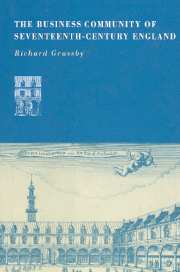Book contents
- Frontmatter
- Contents
- List of figures
- List of tables
- Preface
- List of abbreviations
- Explanatory notes
- Introduction: Questions and sources
- Part 1 Business as a career
- 1 The status of business
- 2 Obstacles to entry
- 3 Funding and risk
- 4 Necessity and choice
- Part 2 Paths to fortune
- Part 3 Life styles
- Conclusion: Private enterprise in a pre-industrial economy
- Bibliography
- Index
1 - The status of business
Published online by Cambridge University Press: 02 December 2009
- Frontmatter
- Contents
- List of figures
- List of tables
- Preface
- List of abbreviations
- Explanatory notes
- Introduction: Questions and sources
- Part 1 Business as a career
- 1 The status of business
- 2 Obstacles to entry
- 3 Funding and risk
- 4 Necessity and choice
- Part 2 Paths to fortune
- Part 3 Life styles
- Conclusion: Private enterprise in a pre-industrial economy
- Bibliography
- Index
Summary
In England, as in other societies, the elite had to justify its privileges and legitimize its authority. A system of ideas and beliefs, whether explicitly formulated as propositions or implicitly assumed as values, differentiated occupational groups and prescribed and judged their rituals and functions. Social attitudes cannot, however, be determined with any precision, because they have to be culled from ambiguous, didactic and impressionistic literary sources. Contemporary generalizations about behaviour are not wertfrei statements of fact, but expressions of opinion, animated by both hope and fear and intended to persuade. Most social observers sought to rationalize prejudices and either to justify or criticize the status quo. They vary in accuracy and authority, according to which interest they represent, whose example they follow and which audience they address. The evidence is so prolific and contradictory that it is possible to construct almost any hypothesis about the respectability of trade by selecting individual examples.
Literary sources are not amenable to statistical treatment. Word counts and ‘content analysis’ usually suggest 1 per cent inspiration and 99 per cent desperation. Opinion cannot be quantified, because weight is more important than number. It is necessary to allow for qualitative differences between writers of greater perception, objectivity, reliability, knowledge, intelligence and forcefulness. The interpretation and evaluation of texts also raise complex technical questions, such as the tone and structure of language, the influence of style on content, the context of remarks and the use of irony, satire, metaphor, allegory and symbolism. Although the outlook of English society is mirrored in its literature, it is important to categorize authors by background and bias and to distinguish descriptions of actual practice from theories of what society ought to be.
- Type
- Chapter
- Information
- The Business Community of Seventeenth-Century England , pp. 29 - 52Publisher: Cambridge University PressPrint publication year: 1995



